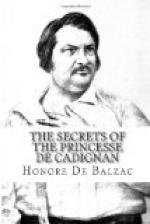pleasure in compromising myself. That was my
revenge! Ah! I have played many childish
tricks! I went to Italy with a thoughtless youth,
whom I crushed when he spoke to me of love, but later,
when I herd that he was compromised on my account
(he had committed a forgery to get money) I rushed
to save him. My mother and husband kept me almost
without means; but, this time, I went to the king.
Louis XVIII., that man without a heart, was touched;
he gave me a hundred thousand francs from his privy
purse. The Marquis d’Esgrignon—you
must have seen him in society for he ended by making
a rich marriage—was saved from the abyss
into which he had plunged for my sake. That adventure,
caused by my own folly, led me to reflect. I
saw that I myself was the first victim of my vengeance.
My mother, who knew I was too proud, too d’Uxelles,
to conduct myself really ill, began to see the harm
that she had done me and was frightened by it.
She was then fifty-two years of age; she left Paris
and went to live at Uxelles. There she expiates
her wrong-doing by a life of devotion and expresses
the utmost affection for me. After her departure
I was face to face, alone, with Monsieur de Maufrigneuse.
Oh! my friend, you men can never know what an old
man of gallantry can be. What a home is that of
a man accustomed to the adulation of women of the
world, when he finds neither incense nor censer in
his own house! dead to all! and yet, perhaps for that
very reason, jealous. I wished—when
Monsieur de Maufrigneuse was wholly mine—I
wished to be a good wife, but I found myself repulsed
with the harshness of a soured spirit by a man who
treated me like a child and took pleasure in humiliating
my self-respect at every turn, in crushing me under
the scorn of his experience, and in convicting me
of total ignorance. He wounded me on all occasions.
He did everything to make me detest him and to give
me the right to betray him; but I was still the dupe
of my own hope and of my desire to do right through
several years. Shall I tell you the cruel saying
that drove me to further follies? ’The Duchesse
de Maufrigneuse has gone back to her husband,’
said the world. ’Bah! it is always a triumph
to bring the dead to life; it is all she can now do,’
replied my best friend, a relation, she, at whose house
I met you—”
“Madame d’Espard!” cried Daniel, with a gesture of horror.
“Oh! I have forgiven her. Besides, it was very witty; and I have myself made just as cruel epigrams on other poor women as innocent as myself.”
D’Arthez again kissed the hand of that saintly woman who, having hacked her mother in pieces, and turned the Prince de Cadignan into an Othello, now proceeded to accuse herself in order to appear in the eyes of that innocent great man as immaculate as the silliest or the wisest of women desire to seem at all costs to their lovers.




